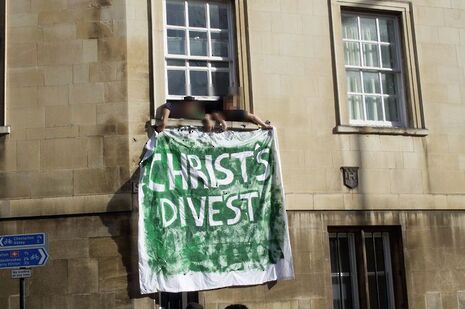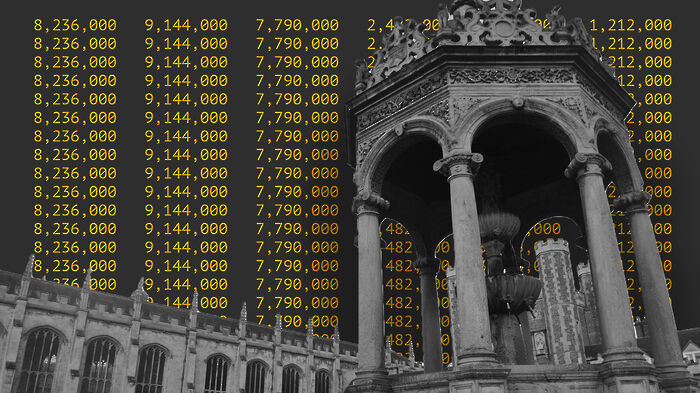Christ’s College Council rejects divestment
Despite several colleges’ recent decisions to divest from fossil fuels, Christ’s College Council rejected a pro-divestment proposal by the College’s JCR earlier this week

Christ’s Council rejected a proposal by the College’s JCR calling for full divestment from fossil fuel industries.
The decision was made last week, on the 20th November, despite pressure from students and staff at Christ’s.
The student representatives to the Council suggested that the decision to reject divestment was allegedly reached due to pressure placed on the College Council by the Bursar and Master, despite significant support for divestment from fossil fuels among students and staff.
Professor Nick Gay, Professor of Biochemistry and Christ’s College Council Member, told Varsity that the “arguments made by the bursar and master are predictable”, that this would be the “thin end of a wedge” leading to boycotts on anything that uses fossil fuel – and would restrict the range of possible investments with no discernible impact.
Gay went on to say that “none of these arguments are persuasive or backed with facts whereas the students’ position [of divestment] was very well researched”.
He added that “as for leadership that should come from the Master but she said that although she personally supports ethical investing she couldn’t countenance it for the College.”
Christ’s College‘s Bursar and Master did not respond to requests for comment.
Varsity and Cherwell investigations published earlier this month revealed the extent of investments by several Oxbridge colleges in the fossil fuel sector.
Christ’s is one of seven known Cambridge colleges with direct investments in the oil and gas exploration industries, totalling £301,000 as well as £422,000 in mining streams company Franco Nevada and £284,000 in Schlumberger, an oil fields services company.
Earlier this week, Downing College Council voted to withdraw all available investments in the fossil fuel sector, becoming one of three Cambridge colleges, alongside Selwyn College and Queens’ College, to announce a position favouring divestment.
The College JCR passed a motion in favour of divestment in November in 2017, after which the matter was brought to the governing body, and multiple fellows expressed their support.
Gay added that he was “disappointed that the majority of my colleagues on the College Council are unable to understand the magnitude of the problems that will be caused by global warming and the urgent need to transition to a carbon neutral world.”
Gay’s remarks echoed his note of dissent submitted to Cambridge’s University Council following their landmark decision against divestment – where Gay, a member of the Council, voted in the minority.
Speaking about the recent College Council decision, Christ’s JCR President Victoria Clingen, told Varsity that divestment “is both prudent and necessary given the climate emergency.
“The notion that colleges can’t divest is completely undermined by the positive decision of Downing College to divest only a few days later.”
A motion was passed yesterday at a Christ’s JCR open meeting condemning the College Council’s decision and demanding that members of the Council – along with the Master and the Bursar – attend a public meeting with students and fellows of the college in order to explain the reasoning behind their decision and to allow college members to voice their opinions.
Clingen said, “College know this is an issue that will not go away, and the JCR will continue to push for full divestment.”
Earlier this month, Christ’s was one of the colleges involved a coordinated banner drop stunt by pro-divestment group Cambridge Zero Carbon, with activists dropping a banner emblazoned with the slogan ‘Christ’s Divest’ beside the Christ’s Great Gate. 175 students at the College have also signed a petition calling for full divestment, making up around a third of the student body.
- This article was amended to correct the attribution of the claim that the College's Master and Bursar placed pressure on the College Council to reject divestment. This was claimed by the student representatives to the Council, not Professor Nick Gay.
 News / Colleges charge different rents for the same Castle Street accommodation2 March 2026
News / Colleges charge different rents for the same Castle Street accommodation2 March 2026 News / News in Brief: waterworks, wine woes, and workplace wins 1 March 2026
News / News in Brief: waterworks, wine woes, and workplace wins 1 March 2026 News / Climate activists protest for ‘ethical careers policy’1 March 2026
News / Climate activists protest for ‘ethical careers policy’1 March 2026 News / Angela Merkel among Cambridge honorary degree nominees27 February 2026
News / Angela Merkel among Cambridge honorary degree nominees27 February 2026 News / Private school teacher who lied about Cambridge degree barred from teaching27 February 2026
News / Private school teacher who lied about Cambridge degree barred from teaching27 February 2026









